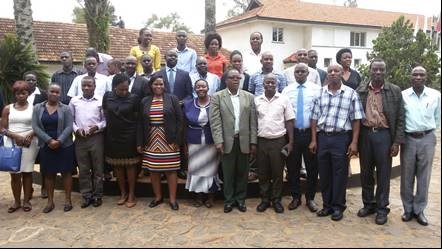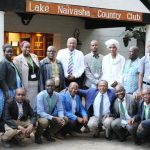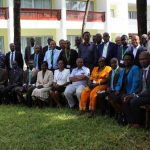A validation workshop for the national Rift Valley Fever contingency plan (RVF-CP) for Uganda was held in Entebbe from 27th to 28th July 2017. A total of 47 participants, drawn from the Ministry of Agriculture, Animal Industry and Fisheries (MAAIF) headquarters and regions, Ministry of health, Ministry of water and environment, the district veterinary officers from the south-western zone, Uganda Veterinary Association, Uganda wildlife authority, prime minister’s office and IGAD/ICPALD participated. The development of this contingency plan on RVF was commissioned by ICPALD through the VET-GOV program of AU-IBAR financed by the European Union.
Dr. Wamalwa on behalf of ICPALD Director, Dr. Solomon Munyua, welcomed members to the validation workshop. He reiterated to the participants that RVF is a zoonotic trans-boundary disease and therefore requires multi-sectoral intervention in case of an outbreak. He further informed participants that following an outbreak in south-western Uganda and a request from MAAIF, ICPALD contracted consultant to support the development of a rift valley fever contingency plan that is being subjected to a validation process for more inputs from all the participants. All were encouraged to contribute freely and share ideas since the memory of the disease outbreak in 2016 is still fresh.
Dr. Nantima Noelina, the assistant commissioner of animal health who opened the workshop informed members that once the contingency plan is in place, it will help in enhancing national preparedness and response to any outbreak of RVF. This will reduce morbidity and mortality in humans and livestock and mitigate economic and social related negative impacts and facilitate post outbreak recovery. She emphasized that the Contingency Plan will guide the coordination efforts of relevant government agencies and private organizations in preparing for, detecting, responding to, and recovering from an outbreak of Rift Valley Fever using a ‘One Health’ approach.
Recommendations and way forward
1. Consultant
• Consultant to incorporate relevant comments made by participants
2. Partners (AU-IBAR, IGAD, FAO, WHO etc)
• IGAD should establish and maintain a RVF vaccine bank and diagnostic kits to support MS in timely diagnosis and vaccination of animals in the region during an outbreak;
• IGAD should coordinate RVF control and prevention in IGAD member states and share regular information about the outbreaks in the region.
3. Government of Uganda
• Present/share the validated RVF contingency plan to/ with the national task force to ensure utilization of the CP as a one health document;
• Ministries of health and MAAIF involved in the control of RVF should allocate funds for the control of such disease emergencies;
• Have regular weather forecasting of the possible RVF outbreaks and inform the concerned stakeholders in time for proper planning;
• There is need to undertake a post outbreak social economic studies to assess the disease impact on affected populations and the country;
• MAAIF to engage OPM and MoFPED for guidance on procedures and mechanism of accessing the National Contingency fund for response to RVF emergencies, and budgeting for a similar contingency fund within the ministries;
• MAAIF and MoH should map out hot spots of RVF in the country;
• A knowledgeable person from line ministry should be nominated as an incident commander during disease outbreaks;
• There is need for continued surveillance in high risk areas using a one health approach, pioneered by ZDCO.
IGAD/ICPALD expresses the European Union for funding the VET GOV project that funded this activity.






